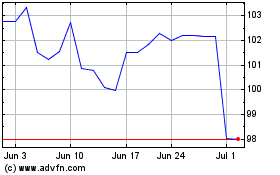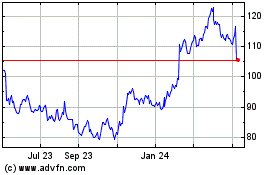BlackBerry Inks Software Deal With U.S. Senate
July 19 2016 - 3:50PM
Dow Jones News
NEW YORK—BlackBerry Ltd. said Tuesday it won a
"multimillion-dollar" contract to supply its crisis communication
software to the U.S. Senate's chief security service, building on
the Canadian company's efforts to reinvent itself as a provider of
mobile-security software aimed at government and business
customers.
Under the five-year contract, the U.S. Senate Sergeant at Arms
office will use the software to power its emergency mass
notification system, used in the event of an attack to alert people
working and visiting the U.S. Capitol complex -- including the
White House, Senate and Pentagon -- and to coordinate a security
response, BlackBerry said.
Waterloo, Ontario-based BlackBerry, which didn't specify the
contract's value, said its crisis communication software services
more than 3 million U.S. government employees.
"We line up what we believe is the most robust end to end,
deepest technology stack in the area of security," BlackBerry Chief
Executive John Chen told an audience here during the company's
annual conference on mobile security.
BlackBerry faces increasing pressure to boost sales of its
mobile security software offerings and patents as it struggles to
augment software and services revenue with sales of new
smartphones. Stung by a 2013 attempt to compete against Samsung
Electronics Co. and Apple Inc. in the device market, BlackBerry has
refocused its attention on developing new handsets aimed at
traditional corporate and government customers that emphasize
productivity and security.
Still, the total number of phones BlackBerry has sold since its
launch in September of the first in a string of new devices dropped
to 500,000 at the end of May from 2.1 million at the end of August
2014.
In its latest fiscal quarter, BlackBerry's reported a 39%
decline in overall revenue amid slumping handset sales. By
contrast, its software and services operations generated a year
over year gain of about 3.5% in the same period and BlackBerry has
said it expects the segment to generate 30% revenue growth in its
current fiscal year.
One challenge BlackBerry's security software business faces is
convincing prospective enterprise customers that its technology
works across different mobile operating platforms, said Rudy
Giuliani, the former New York City mayor known for his efforts to
bring down the city's crime rate during his time in office.
Mr. Giuliani, who flew to New York from the Republican Party
convention in Cleveland to speak at the BlackBerry conference, said
among the fastest-growing forms of crime is the cyberattack,
including national security breaches and efforts to steal money,
identities and trade secrets. Mr. Giuliani is currently chairman of
the cybersecurity, privacy and crisis management practice at law
firm Greenberg Traurig LLP.
Mr. Giuliani, who wasn't paid to appear at the BlackBerry event,
said the company's security remains untarnished among enterprise
customers but that many potential customers still mistakenly
believe it only works with BlackBerry phones. BlackBerry has
updated all of its mobile security offerings to also work on
operating systems offered by Apple, Android and others, as more
workers have migrated to rival devices. Mr. Giuliani said after his
speech that educating customers on this change remains a hurdle for
BlackBerry.
Mr. Giuliani and BlackBerry said they don't currently have a
business relationship, but they are in talks to form one.
BlackBerry's optimism for mobile security is fueled by its
belief that companies and governments will boost investments to
better protect proprietary information and to help guard against
rising insurance and other costs. BlackBerry released a survey on
Wednesday that found 86% of 1,000 executives polled still worry
about potential hacks. The survey, though, also showed that 82% of
respondents indicated mobile-security precautions cause some
frustrations for employees and could hinder worker productivity,
which could pose a potential barrier to winning new business.
Mr. Chen is unfazed, arguing that companies won't have a choice
but to invest in cybersecurity amid growing pressure from
regulators and governments to protect against financial losses and
national security breaches.
"The regulators come in and say (to boards) 'show me your
cybersecurity'," said Mr. Chen, who is a director on the boards of
BlackBerry, Wells Fargo & Co. and Walt Disney Co.
Write to Ben Dummett at ben.dummett@wsj.com
(END) Dow Jones Newswires
July 19, 2016 15:35 ET (19:35 GMT)
Copyright (c) 2016 Dow Jones & Company, Inc.
Walt Disney (NYSE:DIS)
Historical Stock Chart
From Mar 2024 to Apr 2024

Walt Disney (NYSE:DIS)
Historical Stock Chart
From Apr 2023 to Apr 2024
